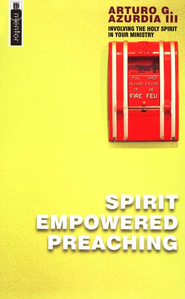Arturo Azurdia: Spirit Empowered Preaching
 Arturo G. Azurdia III, Spirit Empowered Preaching: Involving the Holy Spirit in your Ministry (Great Britain: Christian Focus Publications, 1998), 192 pages.
Arturo G. Azurdia III, Spirit Empowered Preaching: Involving the Holy Spirit in your Ministry (Great Britain: Christian Focus Publications, 1998), 192 pages.
Arturo Azurdia III graduated from Westminster Theological Seminary, California, in 1998 with a Doctor of Ministry in Preaching degree. Azurdia’s book was a requirement for his graduation. (Westminster does not usually allow students to study and write outside of the theological tradition of Reformed Theology).
As a student of preaching, I found greater personal academic freedom in a university setting under a Reformed evangelical homiletician than I did at denominational theological schools in North America. At a denominational seminary a student is usually confined to the tradition of that seminary lest they offend their constituency and the needed support diminishes.
I am therefore pleased and pleasantly surprised that Westminster Theological Seminary allowed Azurdia to study “unction” (Azurdia is from an evangelical Presbyterian tradition). His book presents fresh and welcome instruction to the church. That fact is reflected in the many book reviews written about Spirit Empowered Preaching. The book reviews suggest that there is great hunger for the “unction” in evangelical pulpits. My prayer is that this book will create a strong desire in the hearts of evangelicals who are dissatisfied with purely intellectual Christianity and prompt their study of “unction” more thoroughly.
Azurdia desires to influence ministers to approach their preaching not only intellectually, with a heavy dependence upon biblical languages, exegetical skills and historical research, but to include “unction.” The thesis of his book is “…contending: the efficacious empowerment of the Spirit of God is indispensable to the ministry of proclamation” (13). He seeks a balance between the Holy Spirit and the Word. He proceeds to show the need for the unction and describes the work of the Holy Spirit in preaching, and impresses upon his readers the benefits of being Spirit-filled ministers. His main points are supported by the New Testament and by those people considered to be great evangelical preachers of the past. He shows that the empowering of the Holy Spirit is a sovereign work of God, and that the minister of the Word should be a person of constant prayer. His last chapter, “Pray me full” (164-177) affirms this and is helpful to all ministers.
However, there are three problems with Azurdia’s book: (1) his interpretation of John 14:12; (2) his interpretation of Luke 4:18-19 and 1 Corinthians 2:4, 5 (68, 69); (3) a lack of emphasis on fasting with prayer.
(1) Azurdia’s interpretation of John 14:12 (KJV),
“Verily, verily, I say unto you, He that believeth on me, the works that I do shall he do also; and greater works than these shall he do… .”
Azurdia claims that “greater works shall ye do” refers to the disciples winning more souls than Jesus won (23). There is nothing in this passage to suggest that “greater works” is limited to the preaching of the disciples. “Greater works” is better interpreted to refer to the universal church, meaning that Christians have done greater works than Jesus did, which includes the conversion of non-Christians, and signs, wonders and miracles following the preaching.
Category: Ministry, Summer 2006


